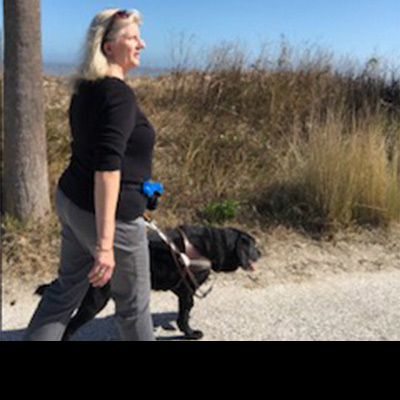Tara Perry has always been interested in recreation—and she’s always been up for a challenge. As a kid in Georgia, she enjoyed going to summer camp, and as a teenager, she became a counselor-in-training. In that role, she was asked to choose an area to specialize in—and she made a bold choice. Tara decided to choose horses, because that was the activity that scared her the most.
In college, Tara took her love for the outdoors and desire to help others a step further, and she decided to major in recreational therapy. This is a field that uses recreation and other activities to help people living with disability or illness to improve their health and quality of life.
Little did she know that she’d be facing her own disability soon.
Tara was diagnosed with retinitis pigmentosa at 15—but, she says, "I don’t remember coming away knowing I would go blind." In her early 20s, however, she does remember an eye doctor telling her, "You’re going to go blind and there’s nothing I can do." Like many people, she was sent away with a diagnosis, but with no information on where to go next.
Tara was told that her vision loss would probably take decades, "but it took months instead," she says. And during those months, she moved forward with her ambitious plans to continue her college studies and earn her PhD at Penn State. She drove to State College, Pennsylvania, in August—and by December she had parked her car for good, as she no longer felt comfortable behind the wheel.
Tara joined a sight loss support group while she was at school, and there she met a long-term friend—someone who also happens to be a Hadley learner. The two of them started working together as buddies, using the eyesight they still had to get around. "I had acuity and she had periphery," Tara says, "so she could find the store, and when we went in, I could read things."
By the time Tara was nearing the end of the second year of her doctorate program, it had become quite a strain to keep up with the reading required—and that was an emotional experience. "It was scary to lose that much vision that fast," she says. "I remember big chunks would just disappear overnight and I would get up and go, 'Oh, what happened?'"
Fortunately, Tara could use large fonts to read on her computer, and she found someone to help with the printed materials—so she kept moving forward with her PhD. And Tara credits at least part of that can-do attitude to her studies in recreational therapy.
"It’s a positive field," Tara says, because it focuses on helping people with disabilities. "It’s not if you can do something; it’s how you can do it," she says. And after a few difficult periods, she started to realize that no matter what happened, she would be OK. "It might not be graceful, and it might not be very elegant," she says. "Whatever I was doing, it might have some rough edges around it. But no matter how many times I got worse, I just had this reassurance that it would be OK."
In fact, Tara has been more than OK—she has thrived. And she’s helped others with and without disabilities thrive, too.
Most of Tara’s work has been as a teacher, helping to train other recreational therapists. But she says one of the most important parts of her job was teaching students that being a part of people’s lives is a privilege. "For people to let you in and trust you and share with you—that’s not something we can take for granted," she says. "It’s a relationship."
Now that Tara has retired, she’s still helping others. As part of Hadley’s peer-to-peer program, she connects with other Hadley members to share experiences. "Hopefully, they learn from me, and I learn from them," Tara tells us. "It’s give and take."
We appreciate the help and positivity that Tara shares with her peers, and we’re proud to name her a Hadley Hero.
